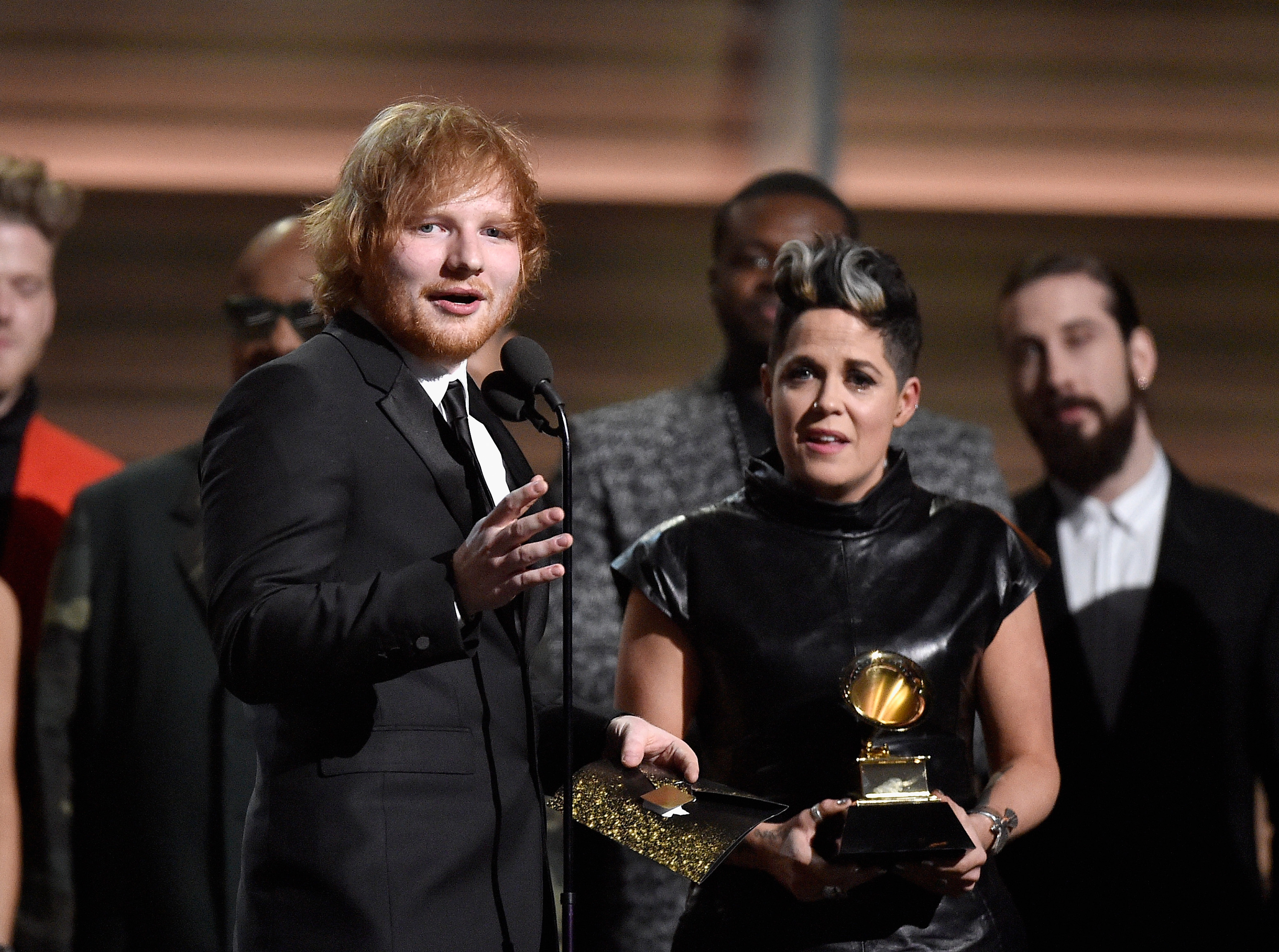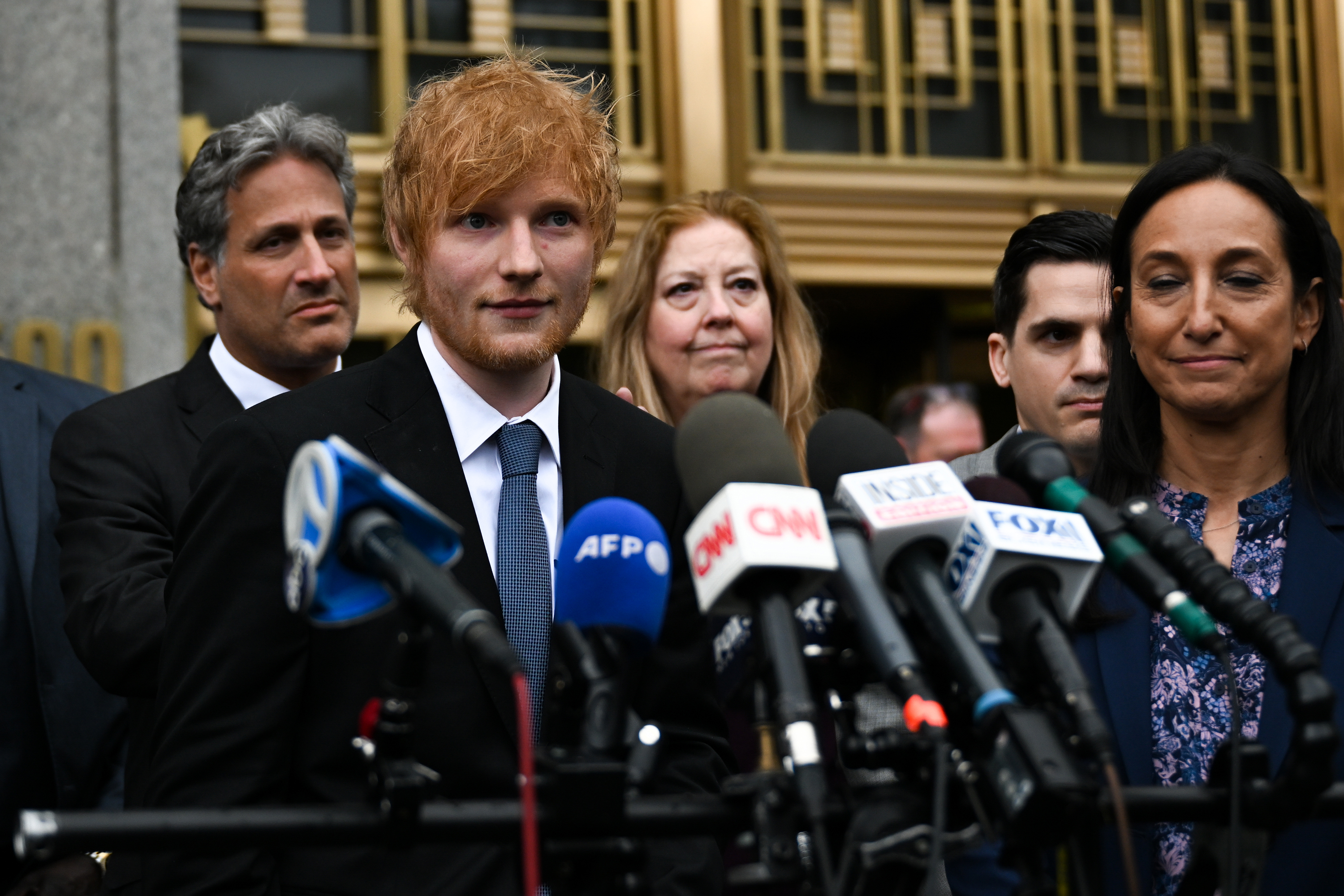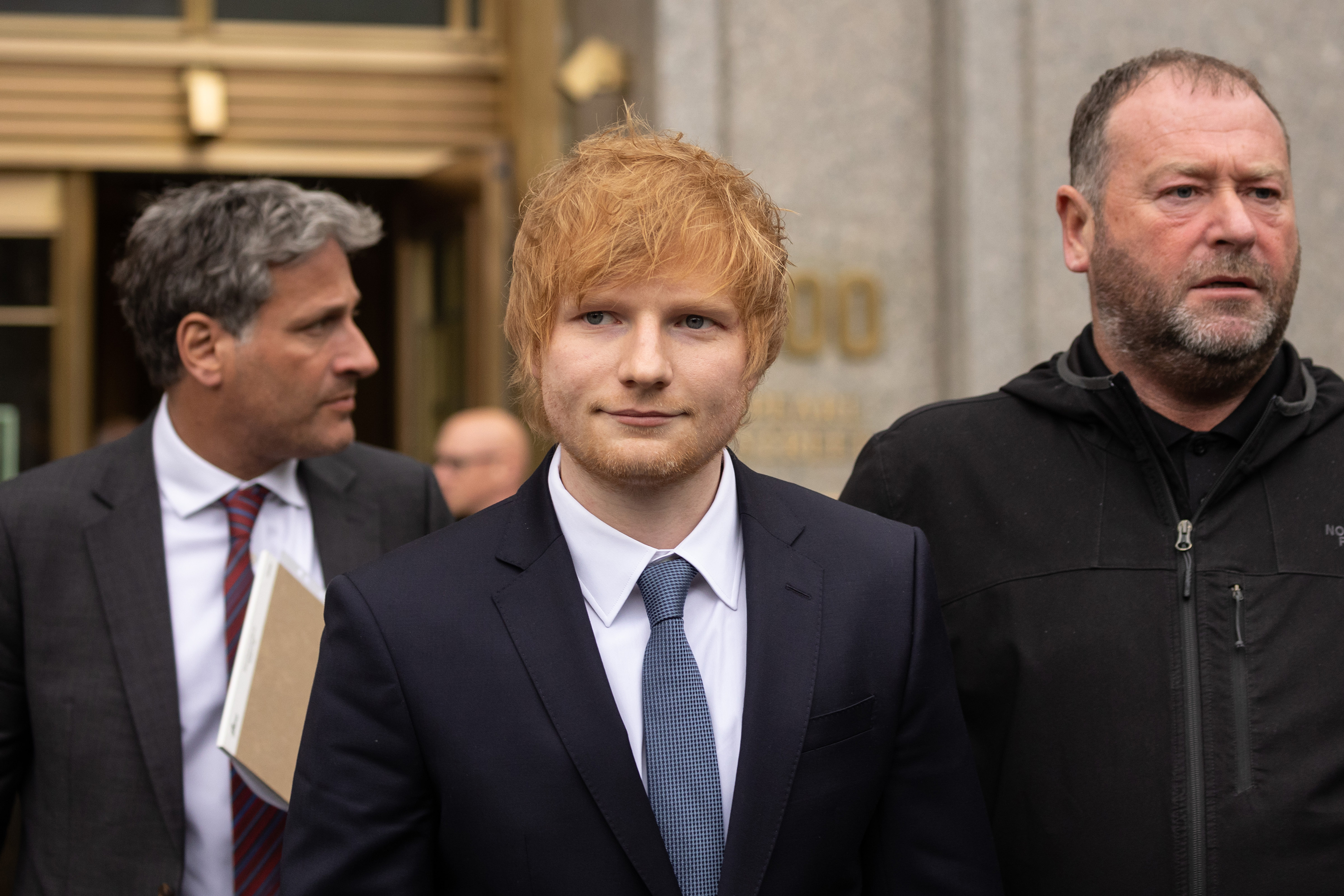We've wrapped up our live coverage. You can read more about the case here, or scroll through the posts below for a recap.
Jury finds Ed Sheeran did not infringe in copyright case
By Jennifer Korn, Matt Meyer and Elise Hammond, CNN
"Thinking Out Loud" co-writer says verdict has big implications for next generation of musicians

When a jury determined that Ed Sheeran's hit "Thinking Out Loud" did not infringe on the copyright of the classic Marvin Gaye song "Let's Get It On," it felt like a weight was lifted off Amy Wadge's shoulders.
Wadge is the co-writer of “Thinking Out Loud," one of her first big hits.
“It was just the most unbelievable relief and like seven years of stress just leaving my body," she told CNN after the verdict was read Thursday, adding that she and Sheeran "had a few tears."
Wadge said the jury's decision in the copyright case has implications beyond "Thinking Out Loud." She said it's important for the next generation of musicians to know that they can still be creative.
"I think it even goes beyond music and the idea that it just comes down to the building blocks of anything — if it was a painting or a film — and for a musician who has just relied upon very little musical knowledge for my whole career, it was terrifying to even contemplate that this could even happen," she said.
The plaintiffs had alleged similarities between the chord progression, harmonic rhythm, and certain melodies in the two songs. Sheeran’s legal team had argued that the melodies are different and the elements used in both songs are common in pop music.
“The fact that this has gone our way is just such a huge relief for every young songwriter," Wadge said. “It's about the next generation of musicians, who they’re going to be and making sure it still happens — music’s still created."
Wadge said "knowing that we did nothing wrong and all the speculation that goes with it" took an emotional toll on her, but the songwriter thanked fans and everyone who supported her and Sheeran for “believing the truth.”
“Because that’s what it was, the truth," Wadge said.
CNN's Chloe Melas contributed to his post.
Juror in Ed Sheeran trial said decision was reached after “a lot of back and forth”
From CNN's Laura Dolan
A female juror in the Ed Sheeran copyright infringement trial called it “a very interesting case” and said both sides “did a really great job.”
“We thought really long and hard about the questions that were presented to use,” Juror Sophia Neis, 23, said of the jury. “We worked through everything as we were instructed to by the judge and by the jury instructions that were given, and we ultimately came to what we thought was the right interpretation of the law we were given.”
Neis said there were seven jurors with differing opinions, initially.
“Everyone had opinions going in,” Neis said outside the court house. “Both sides had advocates and then there the people that were more in the middle and trying to figure out either was what was the best ruling of law in this case.”
Neis added, “There was a lot of back and forth and we all wanted to make sure we were very comfortable with the decision.”
A key factor in the jury’s decision, according to Neis, was Sheeran's performance of the song at the trial.
“It's obviously cool to have anyone play music in front of you live,” Neis said when asked what is was like to hear Sheeran perform during the trial. “So that was an interesting surprise decision because you’re comparing music to a sheet. But it was very cool to hear Sheeran play in court.”
Neis said the testimony from both expert witnesses was also a helpful factor in the jury’s decision, as was the copyrighted sheet music to "Lets Get it On."
Ed Sheeran opens up about the emotional toll of the trial

Musician Ed Sheeran delved into the emotional toll of the trial, explaining that because he had to be in New York, it meant missing being with his family for his grandmother’s funeral in Ireland.
“I will never get that time back,” he said.
“I am just a guy with a guitar who loves writing music for people to enjoy," he said. "I am not and will never allow myself to be a piggy bank for anyone to shake."
He said like other artists he works hard to create songs “based around real-life personal experience.”
“It is devastating to be accused of stealing someone else’s song when we put so much work into our livelihoods.”
Sheeran hugged and spoke at length with one of the plaintiffs after jury's verdict
From CNN’s Nicki Brown
Musician Ed Sheeran and Kathryn Townsend Griffin, a plaintiff in his copyright infringement case, embraced and spoke at length after learning of the jury's verdict.
The jury found Sheeran's "Thinking Out Loud" did not wrongfully copy the Marvin Gaye classic "Let's Get It On," which was co-written by Ed Townsend — Griffin's father.
"I'm glad that we could hug this thing out," Griffin said after court, adding Sheeran had invited her to one of his upcoming shows.
Griffin said she respects the jury's decision.
"I stood up for my father's intellectual property," she said. "This was never about money — it was only principles."
Sheeran said he is "unbelievably frustrated" at "bogus claims" made in copyright lawsuit
Singer Ed Sheeran said he is happy with the outcome of the case, but said he is "unbelievably frustrated that baseless claims like this are allowed to go to court at all."
The artist said it is important for musicians to be able to have creative freedom without the fear of being accused of stealing other songs.
He said in this case his team proved that the chords in question from Marvin Gaye's classic "Let's Get It On" were used in songs before it was written “and will be used to make music long after we are all gone."
The plaintiffs had alleged similarities between the chord progression, harmonic rhythm, and certain melodies in "Let's Get It On" and Sheeran's hit "Thinking Out Loud."
Sheeran said these were "misleading comparisons" and said he was glad the jury saw through the "bogus claim."
“It's simply wrong. By stopping this practice we can also properly support genuine music copyright claims so that legitimate claims are rightly heard and resolved," Sheeran said.
Listen for yourself: Here are the 2 songs at the center of Ed Sheeran's copyright case

Basic similarities or a copy-cat act? When it came to Ed Sheeran's hit "Thinking Out Loud" and the classic Marvin Gaye song "Let's Get It On," a jury was asked to weigh two conflicting narratives.
The plaintiffs alleged similarities between the chord progression, harmonic rhythm and certain melodies in the two songs.
Sheeran’s legal team argued that the melodies are different and the elements used in both songs are common in pop music.
Ultimately, the jury concluded Sheeran had independently created "Thinking Out Loud" and did not infringe on the copyright of Gaye's song.
Listen to back-to-back snippets from the two songs in the video below:
CNN's Lauren del Valle contributed to this report.
Jury finds Ed Sheeran did not infringe on the copyright of "Let's Get It On"
From CNN’s Lauren del Valle and Kara Scannell

A Manhattan jury found Ed Sheeran's hit "Thinking Out Loud" did not infringe on the copyright of the classic Marvin Gaye song "Let's Get It On."
The jury determined that Sheeran had independently created his song and did not wrongfully copy compositional elements or melodies from Gaye's song.
Upon hearing the verdict, Sheeran hugged his attorneys.
The plaintiffs had alleged similarities between the chord progression, harmonic rhythm and certain melodies in the two songs. Sheeran’s legal team had argued that the melodies are different and the elements used in both songs are common in pop music.
CNN's Sabrina Souza contributed to this report.
Jury reaches a verdict in Ed Sheeran copyright infringement case
From CNN’s Lauren del Valle
The jury has reached a verdict in the copyright infringement trial about whether Ed Sheeran's smash single “Thinking Out Loud” copied the classic Marvin Gaye song “Let’s Get It On.”
The jury received the case late Wednesday afternoon and deliberated for approximately three hours.
If the jury decides Sheeran is liable for copyright infringement, the trial will move onto the second phase to determine damages.
The family of Ed Townsend, who co-wrote "Let's Get It On" with Gaye has accused Sheeran of copying the 1973 hit.
The plaintiffs had alleged similarities between the chord progression, harmonic rhythm, and certain melodies in the two songs. Sheeran’s legal team had argued that the melodies are different and the elements used in both songs are common in pop music.



